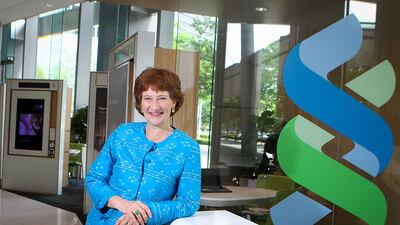Standard Chartered said it would focus on providing more financial services to wealthy individuals in some of the world’s fast-growing emerging markets as part of a five-year plan to boost the total share of income the bank receives from its retail business to 50 per cent.
That push in retail comes as lower commodity prices dampen profits and corporate appetite for borrowing in emerging markets.
"We are absolutely committed to increasing the retail as a proportion of the bank," Karen Fawcett, the group head for retail clients at Standard Chartered, said in Dubai, referring to the bank's operating income.
“At the moment, it’s in the 30 to 35 per cent range. We would like to be in the 40 to 50 per cent range, and the reason it is smaller is because of the success of the wholesale side, corporate and institutional clients. When you look at our five-year projections, we will be getting towards that.”
Ms Fawcett, who is based in Singapore, said that the bank’s strategy to lure more retail clients in Asia, the Middle East and Africa, is chiefly centred around enticing employees of corporate clients to bank with them. And once on board, the London-based lender wants to keep those customers by allowing them to do most of their banking online.
The kind of client that appeals to Ms Fawcett is one that carries a smartphone, and the lender has been working hard to improve its app for Android, which dominates in Asia, she said.
The bank has been scaling down its physical presence, putting branches in strategic locations such as shopping malls where affluent customers are found.
In Pakistan, where Ms Fawcett is bullish, the bank has reduced its branch count despite opening new locations.
Both Dubai and Abu Dhabi are also on the list of the 80-odd global cities that she is focusing on to boost business. Even though the drop in the price of crude oil has dampened some of the prospects for the UAE, Ms Fawcett said that economic growth in the Emirates still outpaces the global economic average. The UAE is currently the fourth-largest contributor to operating income for the bank’s retail business, she said.
"A lot of our business is around commodity players, the oil majors, trade finance, a lot of forex. If your commodities have more than halved in price, the volume of business is substantially lower," she said. "So that's really one thing that's affecting the corporate side of the business. It's not just a UAE issue, it's globally."
StanChart’s Middle East earnings last year were dragged down by increased competition, a low interest rate environment and its exit from lending to small businesses in the UAE. Ms Fawcett declined to comment on reports published this week that the bank was planning to sell its retail banking operation in Oman.
The overall group posted a 30 per cent drop in full year profit last year. That came in part because more than 90 per cent of the bank’s business comes from emerging markets, which have slowed during the past couple of years as commodity prices slumped and deficits widened.
Analysts said it makes sense for the bank to focus on individual customers in emerging markets to compensate for lower commodity prices.
“Retail banking in general is much more profitable than corporate even if you adjust for higher loan losses related to retail and the higher cost-income ratio,” said Jaap Meijer, the head of financial services research at the Dubai-based investment bank Arqaam Capital.
StanChart yesterday said pretax profit in the first quarter fell to $1.5 billion from $1.9bn last year, missing analyst estimates.
mkassem@thenational.ae
Follow The National's Business section on Twitter

